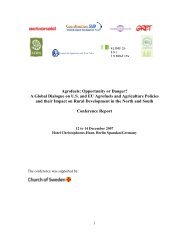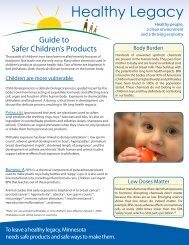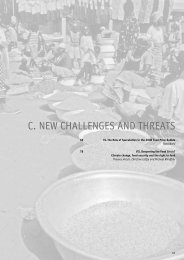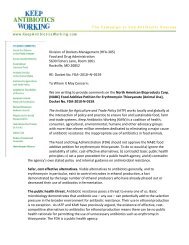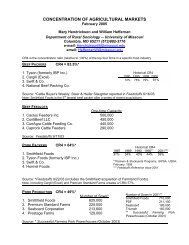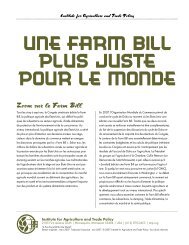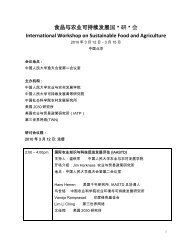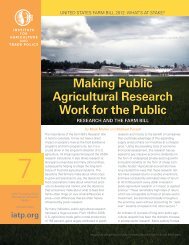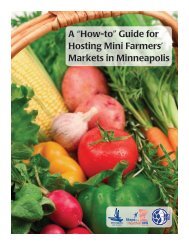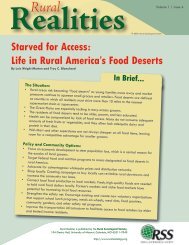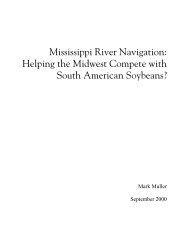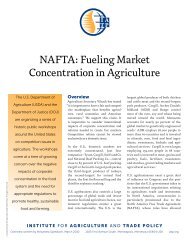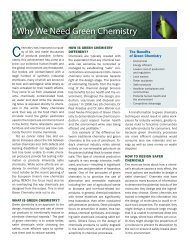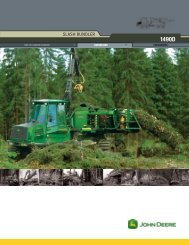IATP Hog Report - Institute for Agriculture and Trade Policy
IATP Hog Report - Institute for Agriculture and Trade Policy
IATP Hog Report - Institute for Agriculture and Trade Policy
Create successful ePaper yourself
Turn your PDF publications into a flip-book with our unique Google optimized e-Paper software.
Section 6<br />
about the effects of intensive systems on the welfare of farm animals <strong>and</strong><br />
making recommendations <strong>for</strong> improved systems.<br />
The Brambell Committee <strong>Report</strong> was "the first careful examination <strong>and</strong><br />
frank discussion of the welfare aspects of intensive animal-husb<strong>and</strong>ry in<br />
any country." 11 Another significant outcome of the report was the<br />
<strong>for</strong>mation of the International Society of Veterinary Ethology in 1967.<br />
With the establishment of this society, <strong>for</strong> the first time the science of<br />
ethology (animal behavior), which <strong>for</strong>merly had been focused on the study<br />
of undomesticated animals in the wild, was turned to the study of<br />
domesticated animals. Basic <strong>and</strong> applied research programs were designed<br />
to identify indicators of well-being <strong>and</strong> suffering in various production<br />
environments <strong>and</strong> to identify key behavioral activities <strong>and</strong> requirements of<br />
farm animals. The Society's <strong>for</strong>mation met another expectation of the<br />
Brambell Committee, that "the evaluation of welfare must consider the<br />
scientific evidence available concerning the feelings of animals that can be<br />
derived from their structure <strong>and</strong> functions <strong>and</strong> also from their behaviour." 12<br />
The new research emphasis led to two l<strong>and</strong>mark ethological experiments<br />
conducted in manmade, semi-natural environments designed to simulate<br />
the natural habitat of wild boar. The first, in a "pig park" near Edinburgh,<br />
Scotl<strong>and</strong>, was conducted by Wood-Gush <strong>and</strong> Stolba in 1978. 17 The second<br />
was conducted from 1983-1987 in a "pig park" near Stockholm by Jensen<br />
<strong>and</strong> others. 18 The experiments demonstrated that, despite decades of<br />
selective breeding <strong>for</strong> intensive confinement, domesticated pigs released<br />
into semi-natural environments are resourceful individuals who soon<br />
acclimate to their surroundings <strong>and</strong> engage in the same critical survival<br />
behaviors as their ancestors <strong>and</strong> wild cousins. Many of the natural<br />
behaviors that ethologists observed provided clues as to why pigs in<br />
animal factories, deprived of the opportunity to fulfill critical species<br />
behaviors, suffer.<br />
In addition to clinical detection of disease <strong>and</strong> injury <strong>and</strong> behavioral<br />
observations, neuroendocrine analysis also is applied to determine an<br />
animal's state of being. Scientists also developed preference tests, <strong>for</strong><br />
example, to allow chickens to demonstrate their preferences between solid<br />
floors covered with litter <strong>and</strong> floors made of bare wire netting. 13 Animal<br />
welfare science became a special discipline, with scientists focusing on the<br />
needs of animals rather than exclusively on how to get them to peak<br />
productive <strong>and</strong> reproductive per<strong>for</strong>mance <strong>and</strong>, more recently, on criteria<br />
<strong>for</strong> production environments that would af<strong>for</strong>d positive experiences to<br />
animals in addition to alleviating the suffering caused by inappropriate<br />
environments. 14,15<br />
The emphasis of the Brambell Committee on the importance of behavior<br />
http://www.iatp.org/hogreport/sec6.html (4 of 30)2/27/2006 3:50:16 AM



